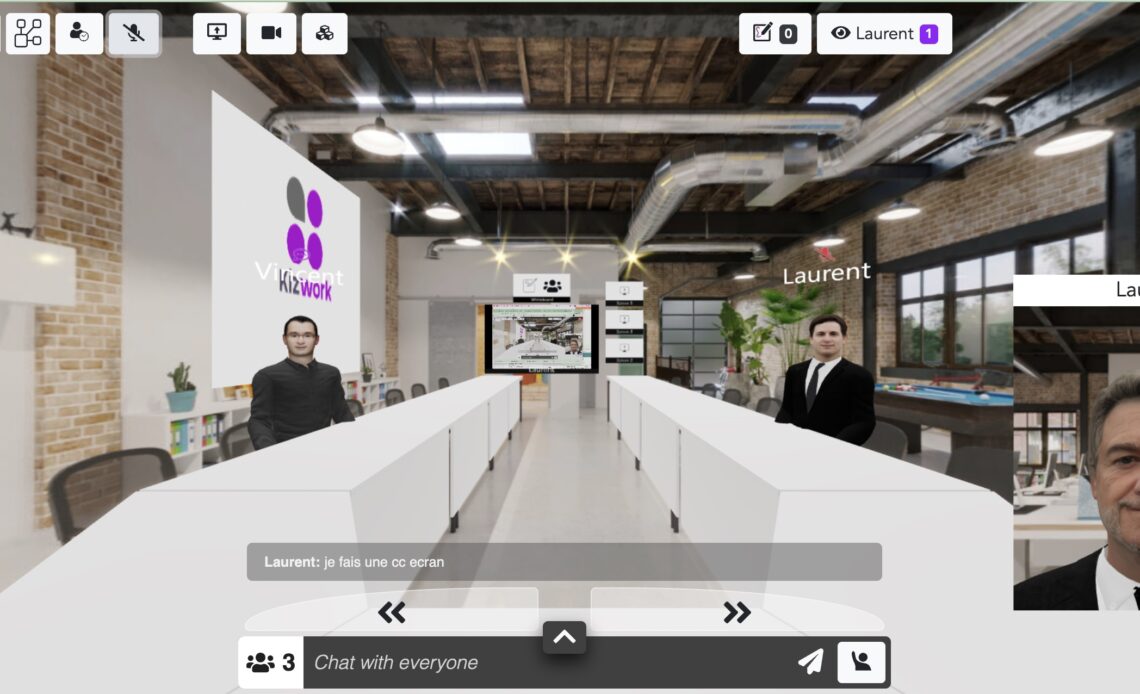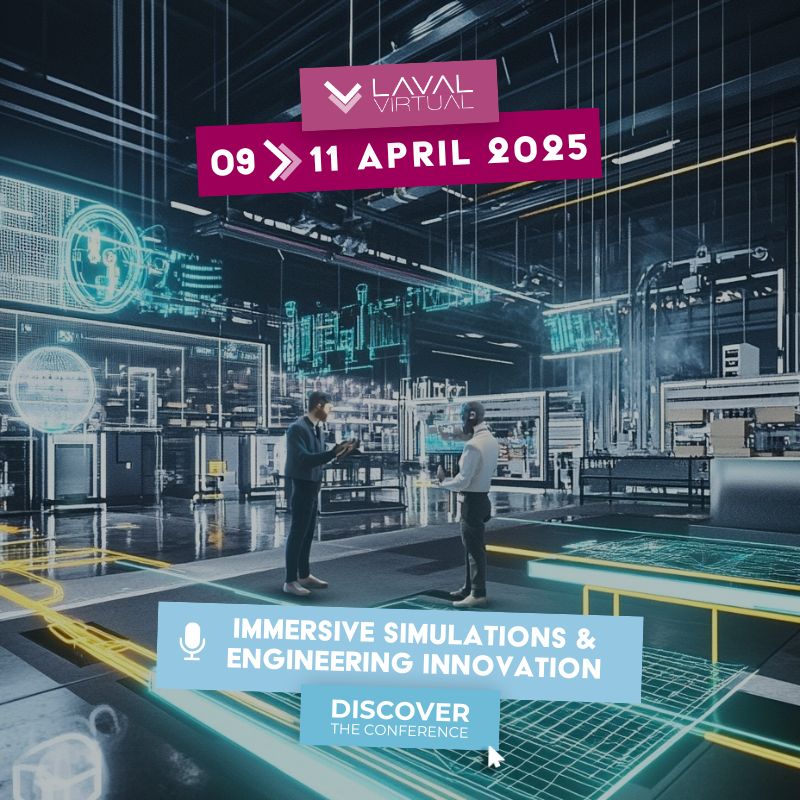
Kizwork is a platform for working online in a virtual office.
Crédits photos : Kizwork
Kizwork offers a platform for employees to work in a virtual office and collaborate online. Kizwork’s ambition with this platform is to reduce the carbon footprint of companies using its solution. Kizwork will be exhibiting at Laval Virtual on April 10-12, 2024, on booth B40. Interview with Laurent Chivallier, Co-Founder and CEO.
Can you introduce your company?
Kizwork is a carbon-neutral hybrid working platform that is renowned for its immersive virtualised rooms and intuitive collaborative tools. It is designed to recreate a living office while preserving corporate identity through digital twins. Kizwork focuses on improving various aspects of a company’s operations. Firstly, it improves creativity and productivity. By encouraging innovative thinking, it encourages employees to come up with new ideas and solutions. It also contributes to remote productivity, ensuring that employees can work effectively from any location.
Secondly, Kizwork aims to reduce its carbon footprint because it recognises the importance of environmental responsibility. By making remote working possible and limiting the need for physical office space, we are helping to reduce companies’ carbon footprints. Kizwork also encourages customer interaction and employee collaboration. Whether it’s responding to requests, solving problems or providing assistance, Kizwork helps streamline communication. In addition, it facilitates the organisation of remote meetings and training sessions, ensuring effective collaboration even when teams are geographically dispersed.
Kizwork’s strength lies in its APIs (Application Programming Interfaces). These APIs can be used to easily integrate various business functionalities such as 3D visualisation, electronic signature, document management and the learning management system. Finally, Kizwork helps to improve the brand image of companies by creating personalised digital twins. These virtual representations showcase products, services or processes, leaving a lasting impression on customers and stakeholders. In short, Kizwork is a multi-purpose platform that combines innovation, efficiency and sustainability to improve a company’s overall performance.
What project will you present at Laval Virtual 2024?
Kizwork is available online and is known for its key features, which are aimed at businesses and organisations looking for a platform for remote collaboration, hybrid working and distance education. It is a sustainable platform that minimises environmental impact. It offers immersive virtual environments with intuitive collaborative tools, and allows users to create avatars for a more personalised experience. It maintains corporate identity by creating a digital counterpart to the physical office, while consuming far less energy and CO2 than traditional videoconferencing solutions. It uses virtual reality and artificial intelligence for an enhanced experience. Finally, it provides security and trust through blockchain technology, generating NFTs and carbon credits. These features aim to make remote working and learning as immersive, creative and collaborative as possible, without compromising performance or sustainability.
Kizwork is a multi-purpose platform that can benefit a wide range of industries, particularly those that rely on remote collaboration and virtual interaction. The following sectors are likely to benefit considerably: education, healthcare, manufacturing, IT and Tech, architecture and engineering, entertainment and media, and retail. These industries can leverage Kizwork’s immersive virtual environments, collaborative tools and digital twins to improve productivity, creativity and reduce carbon footprints, while aligning with ESG strategies.
What innovation do you think has most transformed the world of VR/AR?
Virtual reality (VR) and augmented reality (AR) have evolved considerably in recent years, transforming various sectors, including the workplace. For a start, VR is no longer just for gamers. It has found applications in areas such as healthcare, education and commerce. According to Deloitte, the VR market is expected to grow by 50% in 2023 compared with the previous year, generating nearly $7 billion in global revenues. The benefits are numerous, particularly for training, simulating surgery and treating phobias. VR / AR are widely used in the healthcare sector. They enable robot-assisted surgery, patient diagnosis and the simulation of medical interventions. The global VR and AR healthcare market is expected to reach $4.9 billion by 2031.
VR also offers a safe way of training people in high-risk jobs, such as the military or pilots. It is also used for training the general public. The education and training sector represents a lucrative market for VR, with an overall increase of almost 38% by 2022. Finally, immersive technologies enable teams to collaborate in realistic digital environments. VR facilitates remote communication and the visualisation of complex data. In short, VR and AR have the potential to transform the way we work and interact with the digital world. Their future is bright, and they will continue to shape the way we work and interact. In short, Kizwork is the ideal solution for connecting the unconnected and ensuring optimum digital and social inclusion.
The baseline of our 26th edition is “Act For The Future”. In your opinion, how can immersive technologies impact the world of tomorrow?
According to Kizwork, immersive technologies have the potential to transform the world of tomorrow in a number of ways. Firstly, they can strengthen e-commerce by removing certain barriers. They are tools that can improve the customer experience, particularly through augmented reality, which allows consumers to visualise products in their environment before buying them. New platforms for creating 3D content are revolutionising this new use. They are a way for creators to produce immersive experiences for the general public, affecting sectors such as advertising, entertainment, tourism and industry.
The use of augmented reality and other immersive technologies can also encourage student participation by generating strong emotional pleasure. These technologies have the potential to transform learning by making content more engaging and interactive. Companies can train their employees more effectively using VR and AR. These technologies can also be used to create personalised products, enhance the customer experience and increase the value chain in various sectors. In short, immersive technologies are opening up new perspectives for the future, impacting the way we work, learn and interact with the digital world.



